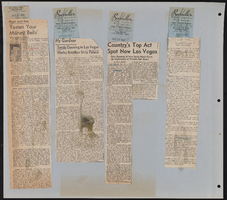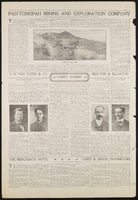Search the Special Collections and Archives Portal
Search Results
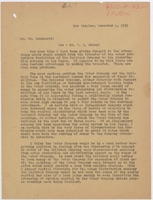
Letter from E. E. Bennett (Los Angeles) to William Reinhardt, December 4, 1951
Date
Archival Collection
Description
Detailed discussion of the UP divesting itself of water production facilities to the Las Vegas Land and Water Company. Written in red pencil at the top of the page: "4705-11-22" and "80-Gen."
Text
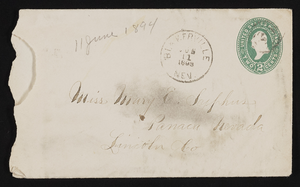
Letter and envelope from John M. Bunker, Bunkerville, Nevada to Mary Etta Syphus, Panaca, Nevada
Date
Archival Collection
Description
From the Syphus-Bunker Papers (MS-00169). The folder contains an original handwritten letter, an envelope, a typed transcription of the same letter, and a copy of original letter attached.
Text

Ashok Mirchandani oral history interview: transcript
Date
Archival Collection
Description
Oral history interview with Ashok Mirchandani conducted by Kristel Peralta, Cecilia Winchell, and Stefani Evans on March 11, 2021 for the Reflections: The Las Vegas Asian American and Pacific Islander Oral History Project. In this interview, Mirchandani discusses his early life in Kolkata, West Bengal, India and arriving to Las Vegas, Nevada in 2002. He talks about Indian traditions he celebrates and Indian festivals in the United States. Mirchandani recalls his employment with the State of Nevada, becoming the Director of the Department of Business and Industry, and advocating for small businesses. Later, Mirchandani describes the importance of minorities in politics, engaging in policy making, and the need for Asian Americans in public services. Lastly, Mirchandani discusses the model minority myth, developing the Nevada Home Retention Program, and emphasizes children's mental health.
Text

Carl Esteban oral history interview: transcript
Date
Archival Collection
Description
Oral history interview with Carl Esteban conducted by William Bailey on December 2, 2022 for the Reflections: the Las Vegas Asian American and Pacific Islander Oral History Project. In this interview, Esteban recalls growing up in Salinas, California in a predominantly Asian community before relocating with family to Las Vegas, Nevada in 2002. As a first generation Filipino America, Esteban's mother sacrificed her life in the Philippines to become the sole person in her family to immigrate to America. Esteban received his degree in Special Education and is currently pursuing to a master's degree in the same field. Esteban is currently a special education educator at the Yvonne Atkinson-Gates Center in North Las Vegas. Throughout the interview, Esteban discusses a wide range of topics spanning from his family migration story, his early childhood, his Filipino identity, Asian stereotypes as the model minority, and how his mentors helped shape him into the person he is today.
Text

Ellen Lempe interview, March 23, 1977: transcript
Date
Archival Collection
Description
On March 23, 1977, Paul Pearson interviewed Ellen Lempe (b. 1928 in Detroit, Michigan). Lempe details her life in Sturgis, Michigan—her marriage, her kids and an automobile accident that resulted in gangrene and amputation—before moving to Las Vegas, Nevada. She recounts working as a telephone operator, gambling after work and a big win playing keno. Moreover, she describes her disinterest for politics, her husband’s love for sports and his work as a car salesman. The two end by discussing inflation and the changing attitude and landscape of the city.
Text

Transcript of interview with Lucille Down by James Hanson, February 21, 1972
Date
Archival Collection
Description
On February 21, 1972, James Hanson interviewed Mrs. Lucille Down (born December 14th, 1911 in Wellington, Kansas) in her home in Las Vegas, Nevada. The interview covers the lives of Union Pacific Railroad workers, and local education at schools such as the Las Vegas Grammar School and Las Vegas High School. Lucille discusses her first job, which was at the Southern Nevada Telephone Company. She also mentions having a swamp cooler attached to her family home. She concludes this interview with recollections on the social, recreational, religious and economic, changes that contributed to the development and growth of Las Vegas, Nevada.
Text
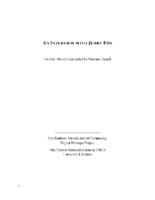
Transcript of interview with Jerry Fox by Barbara Tabach, November 12, 2014
Date
Archival Collection
Description
Interview with Jerry Fox by Barbara Tabach on November 12, 2014. In this interview, Fox discusses his father's restaurant, Foxy's Delicatessen, which opened on the Las Vegas Strip in the 1950s, and his own business endeavors including the Tinder Box and an embroidery business.
Jerry Fox grew up in Los Angeles until his family moved to Las Vegas in February 1955, where his father opened Foxy's Delicatessen, the city's first Jewish deli. Jerry would go on to follow in his father's entrepreneurial footsteps, operating several ventures across different industries, including his own restaurant, Foxy Dog. Jerry sold Foxy Dog in 1975 after going through a divorce, the same year that Foxy's Deli closed.
Text

Transcript of interview with Rachel Gibson by Kay Long & Caryll Batt Dziedziak, August 25, 1998
Date
Archival Collection
Description
Rachel Gibson was the granddaughter of Nevada pioneers. Her maternal grandparents, George Rammelkamp and Anna Dougherty, were among the earliest white residents of northern Nevada, settling first in Dayton and later Yerington. Her mother, Clara Angelina, and her two aunts, Elizabeth and Georgie, graduated from the University of Nevada at the turn of the century. Clara taught in Yerington for a number of years before marrying Chase Masterson, a dentist. Rachel was born in 1913 in Yerington. The eldest of three children, she continued the tradition of women’s learning and education that began with her mother’s generation. Her 1930 class was the first to graduate from Las Vegas High School, and soon after Rachel moved to California to attend college. Although her father had counseled her to study law, Rachel chose the field of economics. She received her Bachelor’s degree from the University of California at Berkeley, and worked in San Francisco for one year before returning to complete
Text

